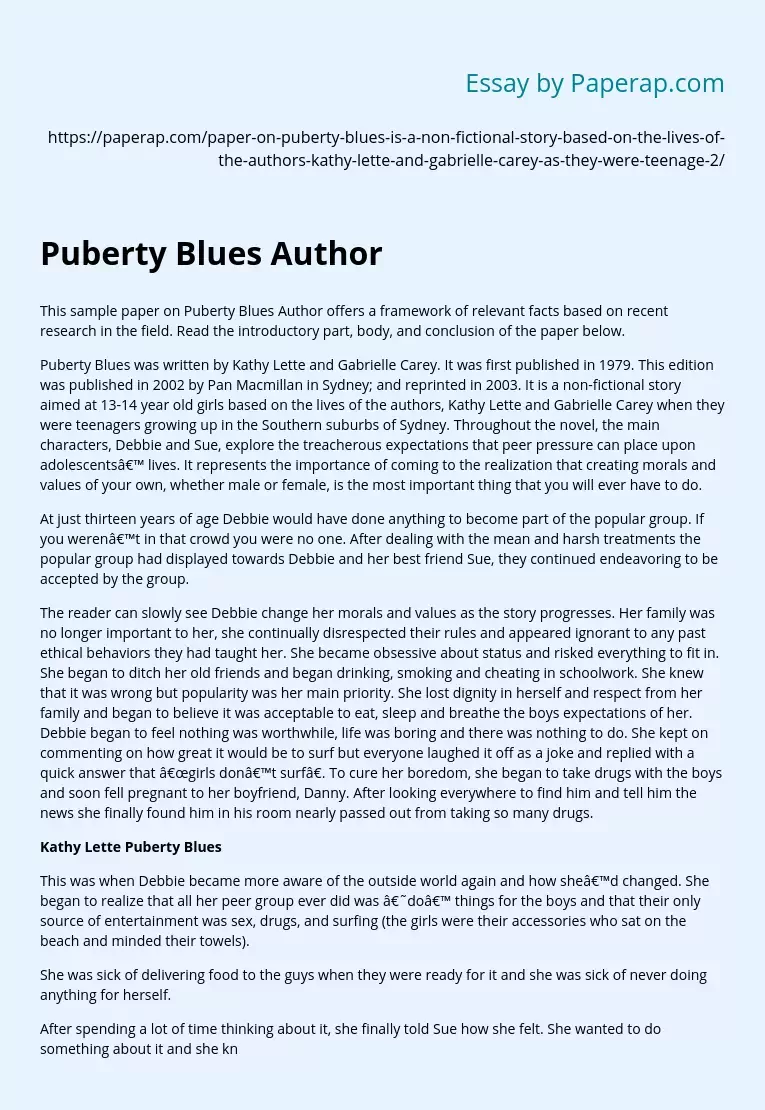Puberty Blues Author
This sample paper on Puberty Blues Author offers a framework of relevant facts based on recent research in the field. Read the introductory part, body, and conclusion of the paper below.
Puberty Blues was written by Kathy Lette and Gabrielle Carey. It was first published in 1979. This edition was published in 2002 by Pan Macmillan in Sydney; and reprinted in 2003. It is a non-fictional story aimed at 13-14 year old girls based on the lives of the authors, Kathy Lette and Gabrielle Carey when they were teenagers growing up in the Southern suburbs of Sydney.
Throughout the novel, the main characters, Debbie and Sue, explore the treacherous expectations that peer pressure can place upon adolescents’ lives. It represents the importance of coming to the realization that creating morals and values of your own, whether male or female, is the most important thing that you will ever have to do.
At just thirteen years of age Debbie would have done anything to become part of the popular group.
If you weren’t in that crowd you were no one. After dealing with the mean and harsh treatments the popular group had displayed towards Debbie and her best friend Sue, they continued endeavoring to be accepted by the group.
The reader can slowly see Debbie change her morals and values as the story progresses. Her family was no longer important to her, she continually disrespected their rules and appeared ignorant to any past ethical behaviors they had taught her. She became obsessive about status and risked everything to fit in.
She began to ditch her old friends and began drinking, smoking and cheating in schoolwork. She knew that it was wrong but popularity was her main priority. She lost dignity in herself and respect from her family and began to believe it was acceptable to eat, sleep and breathe the boys expectations of her. Debbie began to feel nothing was worthwhile, life was boring and there was nothing to do. She kept on commenting on how great it would be to surf but everyone laughed it off as a joke and replied with a quick answer that “girls don’t surf”. To cure her boredom, she began to take drugs with the boys and soon fell pregnant to her boyfriend, Danny. After looking everywhere to find him and tell him the news she finally found him in his room nearly passed out from taking so many drugs.
Kathy Lette Puberty Blues
This was when Debbie became more aware of the outside world again and how she’d changed. She began to realize that all her peer group ever did was ‘do’ things for the boys and that their only source of entertainment was sex, drugs, and surfing (the girls were their accessories who sat on the beach and minded their towels).
She was sick of delivering food to the guys when they were ready for it and she was sick of never doing anything for herself.
After spending a lot of time thinking about it, she finally told Sue how she felt. She wanted to do something about it and she knew what that was. After that day Debbie and Sue bought their very own surfboard. They surfed all day long and had never felt better, and although their group had disowned them straight away she didn’t care anymore. She saw them as a minority group she once strived to be part of.
Puberty Blues is written in first person. This displays a more personal connection between the character and the reader. The authors also project a sense of confidence within the characters about what was cool and what wasn’t. For example, in the first few paragraphs the characters tell you what was cool, they told you the things you must do to become accepted and as they were speaking showed a sense of excitement at the thought of this. They spoke of the boys in a manner which suggested they were “god like” creatures who were so superior to them that it was wrong not to do anything that they said.
The novel is written in simple language yet relates to mature themes such as sex, drugs, and popularity amongst school life which affect the targeted audience who are becoming interested in such ideas and concepts. The language gives the reader a feeling of connection between the text and the ideas, which they can relate to themselves. In the beginning of the novel Debbie spoke in an incoherent manner but as she began to realize her inanity, she became more articulate and competent at expressing a cogent outlook on teenage false perceptions of priorities in life which seem miniscule to the outside world, e.g. popularity.
Because the author includes the main characters throughout the novel, and shows their changes and how they grow as people, the use of an epilogue is one of the most important parts of this novel. It shows some who die from drug overdose and others ending up in jail for crimes they have committed. It shows how important it is to make the right decisions without sounding “lame” to the intended audience.
The paragraph which reflects the most change in Debbie is the last paragraph in the book (p.113).
“We climbed the sand hill at Wanda and looked back. There they were, a mass of black specks way out to sea. The surf had dropped. They sat astride their boards in the grey, flat water; waiting. I knew they’d be talking about their chicks. They always did, way out there when the waves weren’t working.
‘Hey Deb, let’s go get a milkshake’
Sue and I walked off”.
It shows that Debbie at last sees the boys as an overrated obsession. How they’re better off claiming independence rather then living up to other people’s expectations and it also shows that your true friends are the ones who will always be there.
Puberty Blues Author. (2019, Dec 06). Retrieved from https://paperap.com/paper-on-puberty-blues-is-a-non-fictional-story-based-on-the-lives-of-the-authors-kathy-lette-and-gabrielle-carey-as-they-were-teenage-2/

